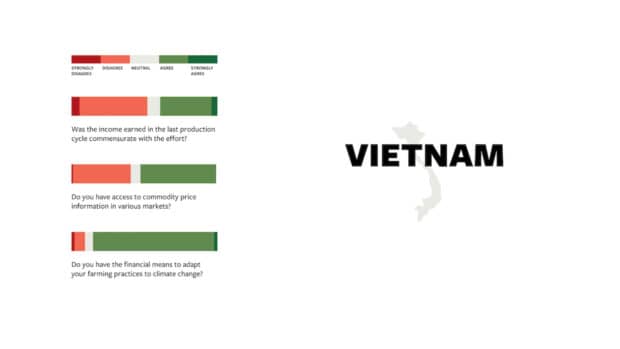[[{“value”:”
The farmer-focused international development firm Solidaridad has been working to put the perspectives of small farmers from numerous agricultural sectors on the map — or on the atlas, as it were.
The group last year released the first version edition of its Small Farmer Atlas, an extensive document supplemented by an interactive online edition that attempts to reflect and amplify the perspectives of small-scale farmers. It uses data from interviews with more than 10,000 farmers from eight agricultural sectors in 18 countries.
The Atlas has since been updated with more sector-specific information, with coffee being one of the main focus areas. Here’s a link straight to the coffee page.
“A lot of sustainability efforts begin from the perspective of the supply chain – why aren’t farmers producing more, how are they investing their limited resources, how do we make coffee work for them (and us), et cetera. This makes certain assumptions and tends to play down the perspectives and priorities of farmers,” Solidaridad North America Senior Communications Manager Kyle Freund recently told DCN. “The atlas tries to meet farmers where they are and explores their needs and the barriers to success.”
The first edition of the Atlas reflects perspectives shared by 1,284 coffee farmers in Kenya, Indonesia and Vietnam. Among those farmers, 27% were women and 81% were small-scale farmers with less than two hectares.
According to Solidaridad, some key findings were:
Roughly 66% of farmers were satisfied with their income, which may be a reflection of overall coffee prices being higher at the time of the interviews;
perspectives on prosperity and inclusivity were more positive among farmers in Indonesia and Vietnam, which the group said is likely due to stronger government support and more efficient production practices;
and farmers with internet access tended to have a more positive perspective on inclusivity and prosperity.
“The main thing is that the insights of the report are indicative; they can point us in the direction where we need to learn more,” Freund said. “That’s why it’s so important to consult farmers and actually hear their perspectives, honor their input. Farmers need to be included when we’re developing policies and practices that affect them.”
Much more information is available directly through the Small Farmer Atlas coffee page.
Comments? Questions? News to share? Contact DCN’s editors here.
Nick Brown Nick Brown is the editor of Daily Coffee News by Roast Magazine.
“}]]


